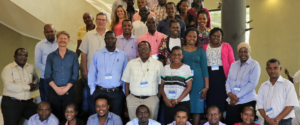When a small Pacific nation relies heavily on one crop as a staple part of the diet of its people and as an important export, the failure of that crop can be devastating. The economic and human cost is substantial.
When, in 1993, Taro Leaf Blight (TLB) all but wiped out the Taro crop in the South Pacific nation of Samoa, this is exactly what happened. Almost 100% of the crop was lost, severely affecting both food security and local cultural practices.
It was events like this that brought about the formation of the Centre for Pacific Crops and Trees (CePaCT) in Fiji.
DArT is proud to offer assistance to CePaCT to help them further their work to protect food and nutrition security in the South Pacific, and help the 22 Pacific island countries and territories to improve crop diversity.
Recent visitors to our lab in Canberra were CePaCT’s Dr Amit Sukal and Semi Cakaunitavuki. They have been using DArTseq technology to genotype the large taro collection maintained for future generations by their home institution, to look for variants which are naturally climate resilient, pest and disease resistant, and with high nutritional value. This is important work for our near neighbours in the Pacific and very much in line with DArT’s social objective of helping to support food security and biodiversity throughout the world, particularly in lesser developed countries.
TLB is particularly prevalent in warm climates with high rainfalls. It begins with water droplets collecting on the upper sides of the Taro leaves and quickly spreads across the leaves and into the edible corms themselves.
Many methods have been tried to control this disease, but in the end it appears that the best defence is to find a variety of Taro that is naturally resistant or tolerant to the blight. This is where genetics can play a role. Through extracting DNA and genetically profiling many varieties of Taro, and comparing our results with phenotypic information, we are able to identify those varieties that naturally have the greatest resistance.
CePaCT was established to coordinate efforts across the region aimed at conserving and best using plant genetic resources. They now have a comprehensive collection of seeds and tissue samples, as well as genotypic data, covering the key crops of taro, banana, sweet potato and yam. This includes the biggest collection in the world of taro, reflecting the fact that 70% of the global diversity of that crop is conserved in the Pacific.
CePaCT then distributes plants and seeds to 53 countries around the world, to support subsistence farming and broader agriculture in many countries.
DArT is delighted to play a part in this, helping not only in DNA extraction and sequencing but also in a comprehensive data analysis of the taro collection. The genomic profiles and understanding of genetic diversity of this collection will help in selecting a more diverse set of varieties of high nutritional value and tolerance to various diseases for release to farmers in the Pacific. DArT and CePaCT are also expanding collaboration to other crops important in the Pacific – like yams, sweet potato and breadfruit. DArT has generated and analysed genome profiles for tens of thousands of samples of these crops, from various genebank collections. Connecting Pacific germplasm collections with global diversity of these crops will be an important outcome of this collaboration.
We are also pleased to be working with CePaCT to develop their capability to carry out this work themselves. This is important to us at DArT. We are committed not only to helping secure the valuable resources of the world, but to making people in many countries self-sufficient in meeting their own local goals.
If you are interested in finding out any more about DArT and our work, or are working in a related area and would like to discuss possible collaboration with us, there is a lot more information – as well as our contact details – on our website diversityarrays.com.



